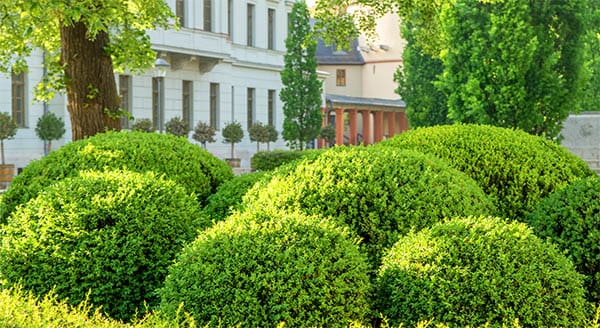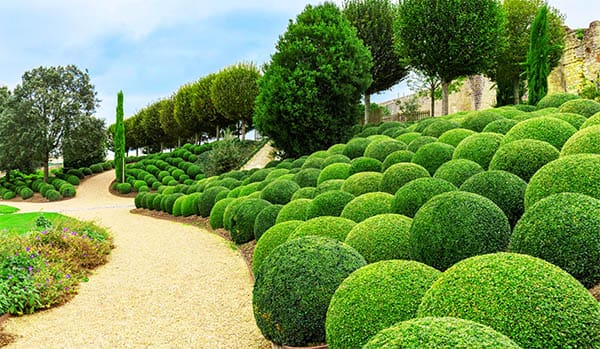Boxwood is a dense, evergreen shrub that is often used as a hedge or foundation planting. Its small leaves and compact growth habit make it an ideal plant for topiary and other formal gardens.
Boxwood is also relatively easy to care for, tolerating full sun or partial shade and requiring only occasional pruning to keep it looking its best.
So, it’s easy to see why so many of us like to use boxwood in our yards.
But, is there more to it than just simple logic?
In this article we’re going to talk about the spiritual and symbolic meaning of boxwood.
Symbolic And Spiritual Meaning Of Boxwood
At first, the boxwood might not seem like a particularly symbolic element in the garden. Beautiful flowers and large, looming trees might feel much more spiritually significant.
However, the boxwood conveys its own important spiritual meaning.
Boxwoods represent the following:
- Eternal life.
- Abundance.
- Strength.
- Resilience.
- Groundedness.
- New life in springtime.
- Innocence.
- Purity.
The Evergreen Boxwood Represents Eternal Life
Boxwood trees and shrubs are the embodiment of timelessness, their evergreen leaves a sign of immunity to all that time can throw at them.

Their slow rate of growth is testament to how long they will last—making boxwoods an emblem for immortal strength!
Many Leaves Represent Mother Nature’s Abundance
The boxwood is a symbol of nature’s overwhelming abundance.
The boxwood’s tightly packed and numerous leaves represent the vast amount that Mother Nature has to offer, even when it appears confined in small spaces.

This evergreen shrub stands as reminder not only of universal wealth available at all times but also our ability to access it if we open ourselves up for its possibilities.
The Boxwood’s Tough Leaves Emblemize Strength And Resilience
The lush, verdant boxwood speaks volumes of strength and abundance; its tough leaves symbolize enduring power that can provide material possessions and both physical and spiritual vitality.
This message of strength is especially applicable to times of hardship.
After all, remember, the boxwood is evergreen and therefore stands for resisting the cold of winter.
Be like the boxwood, when times get hard, rely on your strengths to get through it.
Boxwoods And Groundedness
Representing a vital bond with the earth, boxwood is an evergreen symbol of strength and stability.
With multiple small but firmly branching roots, it communicates our own need to stay connected to what’s around us.

If you’re feeling disconnected from your environment or looking for some grounding in life—reaching out towards boxwood can be your reminder!
Incorporate more root vegetables into your meals like carrots and potatoes if cooking up something comforting helps you calm down.
Furthermore enjoy the outdoors even further by stepping outside barefoot —allowing yourself to feel each tuft of grass underneath as if taking part in this very same connection that plants share so splendidly with their surrounding environment.
Blooming Boxwoods!
Despite not participating in the seasonal cycles of deciduous trees, evergreens still come alive during spring—the springtime is when the boxwood blooms.

The boxwood is a vibrant example that offers more than just fresh greenery; its white blooms signify purity and innocence while their traditional use at funerals can imply solemnity.
This gives us an opportunity to appreciate life’s beauty through our environment as the boxwoods announce new beginnings with each passing season.
Boxwood in Japanese Shintoism
In Japanese Shintoism, boxwood holds a sacred status and is deeply revered within religious practices.
This beautiful evergreen shrub, scientifically known as Buxus sempervirens, is highly valued for its qualities and symbolism.
Boxwood is regarded as a pure and sacred plant in Shintoism due to its evergreen nature, which represents vitality and the enduring presence of the divine.
It is often associated with sacred spaces, such as shrines and temples, where it is utilized to mark and demarcate these hallowed grounds.
One of the significant roles of boxwood in Shintoism is its use as a material for creating shimenawa. Shimenawa are sacred ropes made from twisted rice straw, adorned with various symbolic elements, including strips of white paper called shide.
These ropes are hung in doorways, around sacred trees, or along the entrances of shrines to mark the boundary between the mundane and the sacred.
Boxwood is meticulously woven into the shimenawa, adding a visual and spiritual element to this sacred symbol.
The choice of boxwood for the shimenawa highlights its inherent purity, longevity, and association with the divine realm.
It serves as a physical representation of the sacred space it encloses and acts as a barrier against impure forces or negative energies.
Furthermore, boxwood is commonly used in Shinto rituals and ceremonies as an offering to the deities.
The evergreen leaves and branches of the boxwood are seen as a gift to the gods, symbolizing reverence, respect, and gratitude.
This act of offering boxwood to the deities is believed to foster a connection between the human and divine realms, seeking blessings and divine guidance.
Boxwood in Taoism (China)
Within Taoist traditions in China, boxwood is attributed with powerful protective energies and is commonly employed in the creation of talismans and charms intended to ward off negative influences and promote spiritual well-being.
Taoism, with its emphasis on harmony and balance, recognizes the presence of both positive and negative forces in the world. In order to safeguard individuals from harmful energies and maintain spiritual equilibrium, Taoist practitioners have turned to various natural materials, including boxwood.
Boxwood, known for its durability and resistance to insects, is believed to possess inherent qualities that can repel negative energies and protect against malevolent forces. Its robust and long-lasting nature is considered a reflection of its ability to maintain a shield against harmful influences.
Taoist talismans and charms made from boxwood are intricately crafted with specific symbols and inscriptions representing various protective elements. These symbols can include depictions of deities, sacred animals, or auspicious patterns. The boxwood serves as a medium to encapsulate the spiritual power and intention of these symbols.
The creation of boxwood talismans and charms often involves a combination of rituals, prayers, and blessings performed by Taoist practitioners. These processes infuse the boxwood with spiritual energy and enhance its protective qualities. Once completed, these talismans or charms are believed to serve as potent tools to ward off evil spirits, negative energies, or ill fortune.
Boxwood Symbolic And Spiritual Meaning: Conclusion
Boxwood is a versatile evergreen that can evoke different meanings in our gardens. To some, boxwood represents eternal life and strength. Others see resilience, purity, or innocence in these plants.
No matter what meaning you ascribe to boxwoods, they are attractive additions to any garden that will bring years of enjoyment.
Do you have boxwoods in your garden? What do they represent for you?








